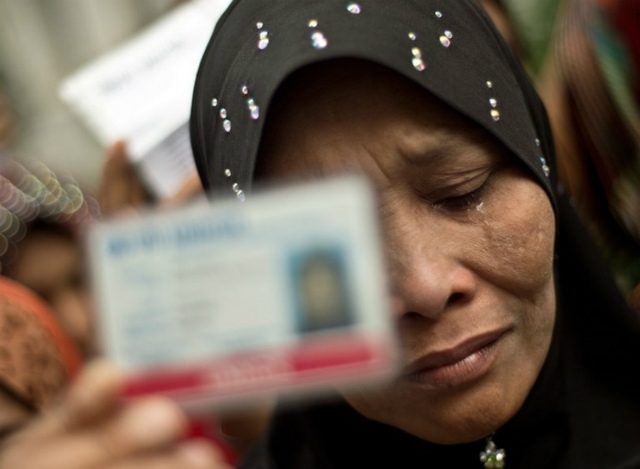SUMMARY
This is AI generated summarization, which may have errors. For context, always refer to the full article.

MANILA, Philippines – The justice department on Monday, May 18, said it doesn’t always expect asylum seekers – such as nearly 3,000 “boat people” from Myanmar and Bangladesh – to secure travel documents before entering the Philippines.
Justice Secretary Leila de Lima explained that, as in any other country, “aliens who enter the Philippines without a passport, or on false passport, are undocumented.”
De Lima said entering the Philippines without a passport violates the country’s immigration law, and “will ordinarily subject them to exclusion proceedings.”
“However, asylum seekers cannot always be expected to obtain travel documents particularly where the agent of persecution is the state. Hence, their situation deserves to be treated and examined in a different context,” De Lima said.
The justice secretary, a former chairperson of the Commission on Human Rights, also described the plight of the boat people as “a humanitarian crisis that calls for humanitarian measures.”
“They may be victims of persecution. In their desperation to leave the territory where their life or freedom has been threatened, or their human rights have been seriously violated, they even become willing victims of human smuggling. It is not uncommon for human traffickers to procure false passports or send their victims off without any travel documents,” she said.
De Lima issued this statement after the Philippine Daily Inquirer reported that the Philippines “will push back to sea undocumented Asian ‘boat people.'”
The report quoted Communications Secretary Herminio Coloma Jr as saying the Philippines “will have to deny” the boat people admission “if they don’t have travel documents.”
Critics slammed the government for supposedly requiring travel documents – something that the stateless Rohingya likely wouldn’t have.
Rohingya ‘may not have passports’
Coloma, however, denied the Inquirer report, and said the Philippines is open to sheltering the boat people.
To clarify the Inquirer report, Coloma pointed Rappler to a text message from Bureau of Immigration Commissioner Siegfredo Mison.
Mison’s statement read: “If boat people claim and qualify as refugees or asylum seekers, immigration will allow entry. Otherwise, we will have to deny admission if they don’t have travel documents.”
In a separate text message to Rappler, De Lima added, “As a matter of policy, they should present travel documents, but it is not an indispensable requirement because there are countries which withhold issuing travel documents as a form of persecution.”
De Lima cited the example of the “boat people” – mostly migrants from Myanmar’s ethnic Rohingya minority.
The UN has labeled the Rohingya as one of the world’s most persecuted minorities. Myanmar brands its 1.3 million Rohingya as foreigners from neighboring Bangladesh, imposing oppressive restrictions and denying them citizenship, despite many having roots going back generations. (READ: Rescued Rohingya in Aceh: ‘We do not have a home’)
De Lima pointed out that the Rohingya “originated from Bangladesh and moved to Myanmar.”
“Both countries do not consider them as their citizens so they are stateless and may not have passports,” she said.
‘Genuine humanitarian spirit’
Despite their probable lack of passports, De Lima said “a process is in place” to grant “genuine asylum seekers” the protection of the Philippine government.
De Lima was apparently referring to the Department of Justice’s Department Circular No. 058, issued in October 2012, titled “Establishing the Refugee and Stateless Status Determination Procedure.”
The United Nations High Commissioner for Refugees (UNHCR), in fact, hailed this department circular in November 2012.
The UNHCR said it made the Philippines “the first country in the Asia-Pacific region to establish a procedure to protect both refugees and stateless people.”
UNHCR representative Bernard Kerblat said this mechanism “is a testament to the genuine humanitarian spirit in the Philippines.”
De Lima pointed out that the Philippines had hosted asylum seekers in the past, even before it signed the 1951 Convention Relating to the Status of Refugees.
She said the Philippines, as early as World War II, “provided asylum to 1,500 Jewish refugees who had been denied asylum in other countries.”
Up to 2,700 Vietnamese boat people also sought refuge in Philippines in the 1970s. These boat people, who fled their country after the Vietnam War, temporarily stayed in Palawan in the Philippines and later got resettled in other countries.
“The Philippines is willing to share to other Southeast Asian countries its experience in the management of asylum seekers,” De Lima said.
The UN has urged leaders of Malaysia, Thailand, Bangladesh, and Indonesia to “uphold the obligation of rescue at sea” and not turn away the refugees in this humanitarian crisis. – with reports from Agence France-Presse/Rappler.com
Add a comment
How does this make you feel?
There are no comments yet. Add your comment to start the conversation.